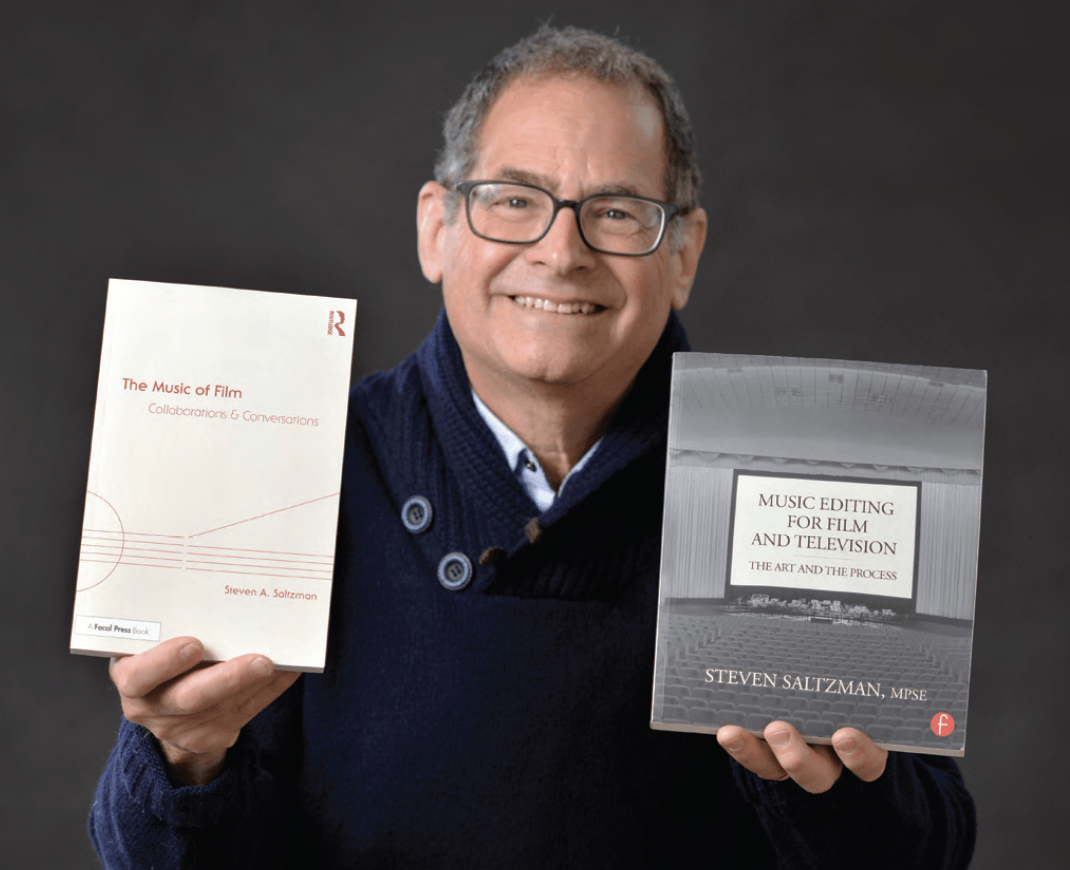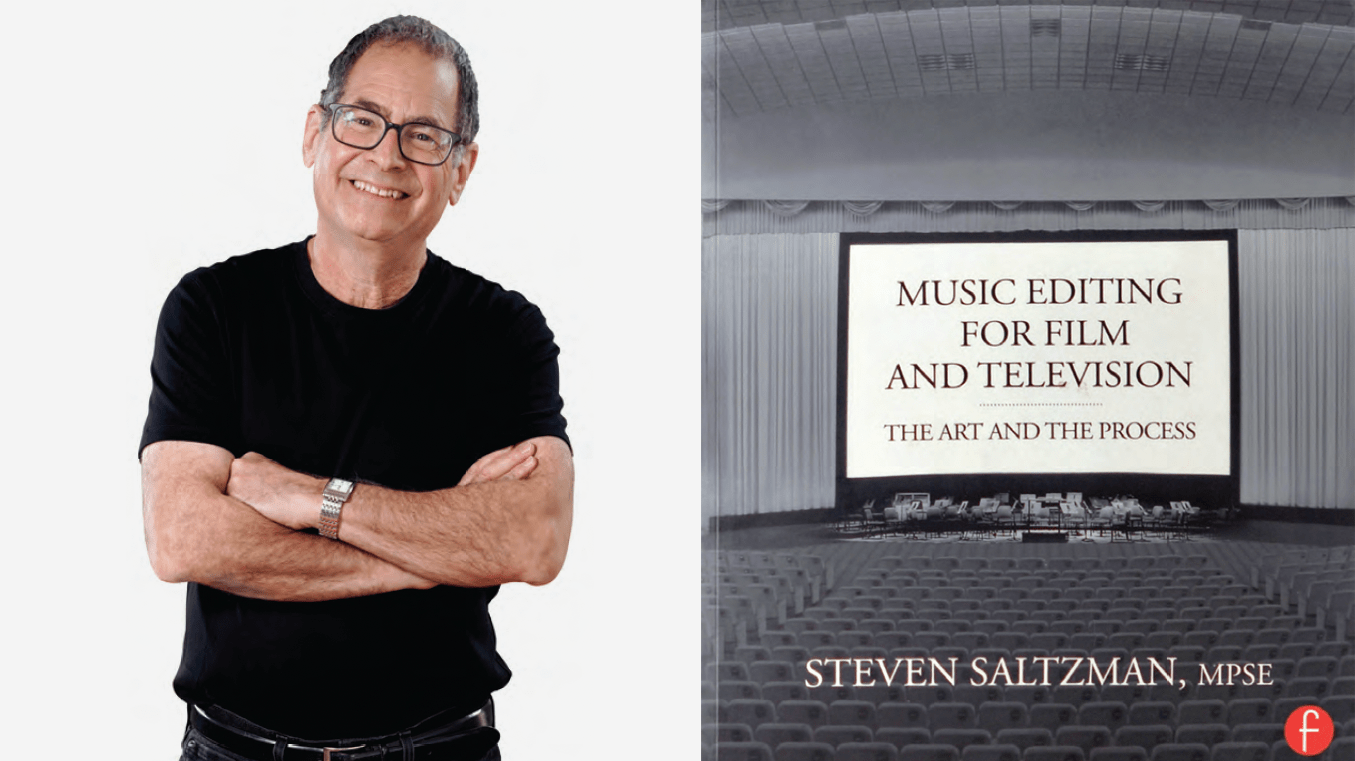By Kristin Marguerite Doidge
A new book is celebrating the creative and collaborative nature of music in film and television.
“The Music of Film: Collaborations and Conversations,” by music editor, composer, and educator Steven A. Saltzman, MPSE, opens up the world of film music from the inside. Through a series of in-depth interviews and conversations with 20 professional composers, music supervisors, music editors, and picture editors, this insightful book provides a comprehensive collection of techniques, tips, and personal insights on how these key players in post-production interact, collaborate, and successfully build their careers.
Saltzman has been music editing for more than twenty years. He is an AMPAS and MPEG member with more than 90 films and television shows to his credit, including “The Package,” “24 Hours to Live” (with Ethan Hawke), “The Revenant” (with Leonardo DiCaprio), and “Tides of Fate.” He has worked with many composers, including Tyler Bates, Klaus Badelt, Laura Karpman, Bryce Dessner, Mark Mothersbaugh, Pinar Toprak, and Nathan Furst. He also enjoys lecturing and teaching music editing and post-production audio for composers, editors and filmmakers in multiple venues including a continuing core course at UCLA Extension.

Saltzman with his books. PHOTO: MARTIN COHEN
Previously, Saltzman wrote the book “Music Editing for Film and Television, The Art and The Process” published by Routledge/Focal Press in 2014.
CineMontage recently caught up with Saltzman to learn more about what inspired his new book and what makes it essential reading for composers, editors, directors, and producers—aspiring and established alike.
CineMontage: I’m curious to learn how the book first came about and more about the process of writing it.
Saltzman: I wanted this book to be a resource that would inspire and guide, a filmmaker, picture editor, director, sound designer, composer, students or new graduates with these career dreams, or anybody in the industry just starting out.
‘It’s about timing, and maintaining the composer’s idea.’
I felt it was important to ask critical questions of the interviewees such as: what is success to you, how did you get started, what are your approaches when working with difficult people, and how do you specifically interface and collaborate with each of these other four key players?
As I dove into the research, interviewing and writing, there was an interest in things rarely discussed in the industry: the work/life balance, the challenges of a career in the arts, the impact of intense work followed by the inbetween periods of no gigs, are the impact of all of this on family, and the meaningfulness of one’s work.
One of the things about the process was coming back to my personal experience of moving to Los Angeles and struggling as a composer with a young family. We were challenged by my dream and reality of breaking into a Hollywood career. My wife Katherine took on the burden of being the breadwinner in a demanding vocation. Money and time were tight. As a stay-at-home dad, I juggled pursuing building relationships in the industry and finding any opportunity for work. Despite the stressors, we made it work, but how did others?
Exploring many elements of the work created a whole picture of what it entails professionally and personally to pursue these career paths. It was amazing to hear the many perspectives and insights.
CineMontage: How did you settle on 20 interviews?
Saltzman: I looked at the core roles in music and film, focusing on composers, music editors, music supervisors, and picture editors who I felt are intrinsically involved in the creation of music and the delivery of the music soundtrack through to the final print master. There are many others involved, yet limiting it allowed for in-depth exploration.
I think [my word limit] was 80,000 words, a standard starting point. And very soon after doing some interviews, I reached out to the publisher and conveyed [that] I want[ed] to do fewer but more in-depth interviews, which would require upping the word limit. Fortunately, they agreed, expanding the word count to 140,000. That helped a lot. I ended up with about 6,000 to 7,000 words per interview, resulting in the 20 conversations that covered a range of diversity and experiences.
The laborious process was what to choose to leave in and take out without losing the meat or the impetus of what they were saying. Many words were left on the cutting room floor, if you will. The publisher expressed an interest early on to do streaming audio of the interviews. That’s not in the works as of yet, but I hope it will be in the future.
Cinemontage: What does the book editing process feel like compared to music editing?
Saltzman: I would not have thought of comparing editing of words to the editing of music. However, William Ross in his interview, talking about his composing style and approach, said, “… So often, in trying to move freely through various tonal centers they want to just jump there —they don’t understand that you can horizontally set it up just like I’m putting these words together in a way that moves you to the spot that makes total sense — I can arrive at that chord. It’s very similar to the way we stick words together to make meaning and arrive at a certain meaningful spot. Music is similar in that regard.”
To be honest with you, I believe I’m a better music editor than author editing words. Analyzing it closely, I would suggest that when we are asked to edit a piece, our goal — for a multitude of reasons — is to maintain the composer’s intention and musicality. A listener should not even notice, as they’re not analyzing it as a composer or a musicologist, they’re just listening and getting the emotional impact.
If I were to extrapolate that into editing words or sentences, I guess one could use the same rule of thumb in that there are structures in the language that we use, just as in music.
But there’s also the artistry. One of the many responsibilities of a music editor involves when there’s a picture change: conforming. When the director moves a scene or takes out or adds frames, seconds, or minutes to the picture, music, sound, and dialogue have to be adjusted to the same extent that the picture was altered. It’s about timing, and with music, you have to maintain the integrity of the composer’s original idea.
As an author, in writing your book, you have to glean the most essential information while maintaining the integrity and the impetus of what was said overall. So I think that’s a very similar kind of mindset.
CineMontage: What’s your advice for those just starting out and perhaps might be going through those challenging early days you experienced?
Saltzman: One gem of advice that showed up in these interviews—which I also take to heart in my work and teaching—is that trust often influences our careers. If I were asked what I’d recommend, it is to be a trustworthy person and professional. People’s careers are on the line with any creative work—a film or a television show or a book. Creative collaboration requires good communication, technical skills, a willingness to admit mistakes, to be continually learning, finding humor in the tough moments, and a great attitude. Whether you are a composer, music editor, picture editor or music supervisor, integrity and trust go hand in hand. You’ve got to have faith and trust people. And that carries one’s career, I think, further than almost anything.
Kristin Marguerite Doidge is a frequent contributor to CineMontage and the author of “Nora Ephron: A Biography.”


